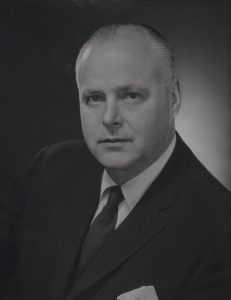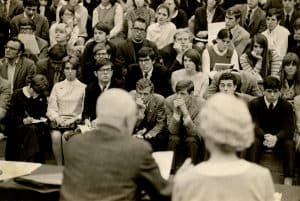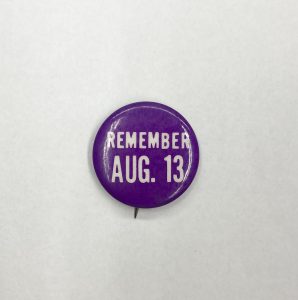“Remember August 13th:” HWS in 1968
By Andrew Pilet, Hobart College Intern
On August 12, 1968, eighteen of the twenty-four members of Hobart and William Smith Colleges’ (HWS) Board of Trustees held a special meeting in Rochester. Citing disagreements about “philosophy of college financing” and overall “fundamental differences of opinion,” they held a vote of ‘no confidence’ in President Albert Holland, that passed 10-8. Holland was not present for the meeting. The Chairman of the Board, Merle Gulick, met with Holland the next day, August 13, whereupon Holland submitted his resignation.[i]
Immediate reactions from the Colleges’ community varied. Professors like those from the Modern Languages department (particularly Eugene F. Murphy and Georgette Marcelle Moraud) expressed their support for the Board, warning against “politics […] being injected into academic life.” Meanwhile, fifty-four pro-Holland faculty members had signed a letter registering their “shock and dismay at his resignation.” Warren Hunting Smith, a future Trustee, called Geneva a “tempest-tossed shipwreck,” due to the Board’s “cut-throat business world” like treatment of Holland and the Colleges.[ii] Rodney Frelinghuysen, President of the Student Association, called together a meeting in Rowe, Massachusetts, to inform the larger student body.[iii]
In response to pressure from alumni, students, and even fellow Trustees, the Board held another meeting in Syracuse on September 4. Holland was, once again, neither present nor invited. After “another close vote,” the Board voted to accept Holland’s resignation. In the same meeting, Merle Gulick submitted his own resignation as Chairman.[iv] Gulick, afterward, asserted that his resignation was not related to Holland’s removal, but because he had been intending to leave the position for some time and “open the door for a less conservative, younger man to take over.” At the center of Gulick’s disagreements with Holland’s educational policies was his “trying to change little, 150-year-old Hobart in a hurry.”[v]
‘Change’ was the source of tension and unrest at the Colleges. Fred Sokol and Ron Berenson, the editors of the student newspaper, The Herald, argued that the Board was opposed to the “liberal posture” that Holland brought to the school. They found the Board “upset over controversial speakers, appearances, the liberalness of the students, the involvement with student’s rights, politics, and the freedom of the student press.”[vi] A faculty member, Janet Seeley, found that “the loss of so inspiring an educational leader [as Holland] may set us back for many years.”[vii]
Holland, in a statement given to The Herald for its September 21 issue, defended his budgeting philosophy, demanding that “the Colleges enter the mainstream of American education and thought” by moving “towards the 1970’s” and not the “‘unbalanced, 1920-type educational community’” that existed before. He argued. above all, that the Board was afraid of students taking responsibility and participating in governing the Colleges.[viii]
The fall semester of 1968 was rife with student discontent and protest at the Colleges, beyond just the Vietnam War. Early in the semester, students (alongside faculty) demonstrated against the establishment of an Air Force Reserve Officer Training Corps recruitment center on campus.[ix] Meanwhile, dissatisfaction with numerous school facilities and policies ( an inadequate library, overcrowding in the Saga dining hall, and cramped living quarters for upperclassmen/adults in Superdorm, now commonly known as JPR) sparked frequent clashes between the student body and the Board.[x]
While a resolution to censor the Board for removing Holland without a hearing was dismissed by the William Smith Student Council by a 7-12-5 vote, the non-administrative student body frequently critiqued and rebuked the Board wherever possible.[xi] For instance, “Residential What?”, a letter to The Herald by Eric Shelley, accused the Board of a paternalistic, hyper-vigilant treatment of students, keeping them under constant surveillance and supervision.[xii] Similarly, in his article “Trustees Don’t Measure Up,” Wilson Faude argued that Trustees were simply unqualified to run a college. He proposed a mandatory retirement age of seventy, more educators on the Board, and a rotating system of elections.[xiii] Faude reiterated these opinions in a following issue, where he made the point that students have an obligation to question the Board on running the school.[xiv]
On October 9, a letter from “Publius and Etc.” compared the Trustee-student relationship to that of the American colonies and England before the American Revolution. They ended the letter with the lines: “The time has come for our continent to rid itself of the ties with their island — do not simply remember August 13th — have a tea party, seventy-six style.”[xv]
These opinions coincided with a series of escalating campus meetings. On October 2nd, 150 students met in Superdorm regarding the “existence of a Master Plan, order of priorities, the role of the Trustees, and the need for action on the part of the students.” The students ended up calling an all-colleges meeting, due to a perceived failure of the Board to accommodate and account for the opinions of students and student committees.[xvi] This all-colleges meeting occurred on the night of October 8 in Albright Auditorium. Around 550 students gathered, planning for a meeting with the Trustees by creating questions and holding votes. At one point, only four students of this group voted in approval of “ultimate Trustee control of campus affairs.”[xvii]
This culminated in a final meeting on October 11. There, 1600 students listened to Chairman Robert Doran and the Board of Trustees respond to the questions and issues prepared on October 8th. The Board argued that the school simply did not have the funds to fulfill many of the requests that students had (a new library, expanded dining hall, student housing), that the Emerson Report remained as their official list of goals (and thus ‘master plan’), and that student engagement would be sought out at every moment possible. While largely placating the frustrations of students, the Board stirred them up by admitting that they were ignorant to the housing issues on campus, explaining that it was not customary to seek bids for major projects (e.g. construction, consultation), and for refusing to elaborate on Holland’s firing. In the end, the students held a motion of “no confidence” in the Board which was soundly defeated.[xviii]
Leading up to the election of 1968, student unrest post-Board meeting was more legislative. Demonstrations gave way to meetings of groups like the Hobart College Assembly and the Hobart Student Movement (HSM). The former, in another entreaty to the Board on October 17th, called for the adoption of a formal Master Plan; approved off-campus living for seniors and students over twenty-one; increases in scholarships and faculty salaries; and, among others, for students to be allowed as members of the Board with full voting privileges.[xix] The HSM on October 22 passed legislation calling for reforms to student discipline and regulations — including less restrictions for women in Hobart dorms and bedrooms.[xx] Going into the election, then, the current overtaking student and campus culture at HWS was a sense of self-regulation, advocacy, and resistance (both demonstrative and legislative).
Check back for Part 2, When Hobart Washed the American Flag.
HWS President Albert Holland. Courtesy of HWS Archives.
President Holland with the Board. Courtesy of HWS Archives.
The Board speaking with students. Courtesy of HWS Archives.
“Remember August 13” pin. – HG Collection
Works Cited
[i] “Holland Forced by Trustees To Resign Post as Colleges’ President; Parents, Alumni, Students and Faculty Protests Are Not Recognized.” The Herald, Sep 21, 1968.
[ii] Smith, Warren Hunting. Letter to Adaline Glasheen. Sep 8, 1968.
[iii] Ibid.
[iv] Ibid.
[v] “Gulick Resigns as Chairman of Board; Cites Own Conservatism as Main Course.” The Herald, Sep 21, 1968; “Holland Forced.”
[vi] “Holland Forced.”
[vii] Seeley, Janet. “After Holland.” The Herald, Sep 27, 1968.
[viii] “Holland Statement ‘To all that is to be — Yes!’” The Herald, Sep 21, 1968.
[ix] “Students and Faculty Protest Against AFROTC; The Art of War Is Not a Part of the Liberal Arts.” The Herald, Oct 4, 1968.
[x] “Must We Overcome.” The Herald, Oct 4, 1968; Wasserman, Rich. “New Library: Miss Necessity 19??” The Herald, Oct 4, 1968.
[xi] “Dr. Doran Agrees To Meet With HSA; William Smith Declares Censorship.” The Herald, Oct 4, 1968.
[xii] Shelley, Eric. “Residential What?” The Herald, Oct 4, 1968.
[xiii] Faude, Wilson. “Trustees Don’t Measure Up.” The Herald, Oct 4, 1968.
[xiv] Faude, Wilson. “Students’ Responsibility To Question.” The Herald, Oct 8, 1968.
[xv] Publius and Etc. “Common Sense.” The Herald, Oct 9, 1968.
[xvi] “Campus Questions Boil to the Top as Upperclassmen Meet In Superdorm.” The Herald, Oct 8, 1968.
[xvii] “Mobilized Students At Albright Meeting In Preparation For Trustees on Friday.” The Herald, Oct 9, 1968.
[xviii] “Trustees Confronted By 1600 at Bristol Meeting; Answer Student Questions With Opinions and Ideas.” The Herald, Oct 18, 1968.
[xix] “Hobart College Assembly Meets for First Time; Requests Board of Trustees To Adopt Master Plan.” The Herald, Oct 18, 1968.
[xx] “Hobart Student Assembly Passes Reform Legislation – Students Given Responsibility To Form Own Social Reg.” The Herald, Oct 25, 1968.
This article was brought to you in part by our supporters. Be our partner in telling Geneva’s stories by becoming a Historic Geneva supporter.



